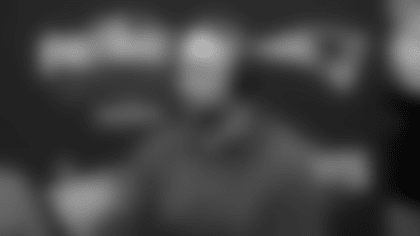LB BRANDON COPELAND
VIDEO CONFERENCE
May 6, 2020
Q: What was your opinion of the Patriots when you played for teams? When you became a free agent, what brought you to New England?
BC: I think the opinion, when you watch and obviously going against the Patriots, is they're a team that does not make a lot of mistakes. As coaches, every single week, you try to go into potential areas and really every week, when you're going against 'a dynasty' like the Patriots, coaches try to sell you and tell you, 'You don't have to play superhuman. You don't have to do all X, Y and Z. We've just got to play our game and outplay them.' But ultimately, the coaches tell me that they understand that you actually have to play pretty damn well to compete and keep up with these guys because as a unit, they move – and I should probably say we move as a unit – collectively. When you look at them in the past on film, you can tell there is a lot of trust on the field in terms of people being in the right position, the right time, not too many guys trying to do multiple jobs in the sense of feeling like they need to overcompensate for the man next to them. So, I think that they vibe really well as a team in the years I've looked at them and gone against them. As a free agent, coming in and having an opportunity to be a part of this organization – I think the simplest way to put it is there are certain things that you do in life where you have that tag line, so to speak, and you don't have to explain anything else after that. This is going into my fifth team, my eighth season in the NFL, and once I told a couple of my buddies or just a random person, 'Hey, I'm playing with the Patriots now,' period. I hope this doesn't come off as arrogant or anything like that, but it's like at that point in time, whoever I'm talking to understands that I'm a legit player, right? Just because you wouldn't make it into this organization unless you were. And it reminds me of my rookie year, for example, I played with the Baltimore Ravens, another pretty well-established franchise, so to speak. And I remember my rookie year, one of our first defensive meetings, there were 26 of us rookies in the meeting and the coordinator at the time, Dean Pees, comes in and says, 'You don't even make it in this room unless you are an animal. Unless you are just a legit athlete, defensive player, savage-like on the field, you don't even make it in this room, so let's take that out of the equation. Now, what will keep you in this room is your attention to detail, your preparation, all those types of things.' So I think it's eight years later – being an undrafted free agent, at that time I'm wide-eyed and just trying to keep up. Now, eight years later, to come and step into another organization that's like that, I'm extremely excited.
Q: You have a unique background, graduating from the University of Pennsylvania in a degree that matches your head coach. Have you had a chance to talk with Bill Belichick, and is he aware that you both have the economics backgrounds?
BC: That's a great question. Yes, I've had the chance to talk with him. I'm not sure – I didn't even know that he had an economics background. That's pretty cool. But no, we haven't particularly spoken about that.
Q: How do you think your experience as an undrafted free agent making the team with the Ravens has helped you along in your career?
BC: Yeah, I think, to come into the league and to go a franchise like that – well, let's backtrack. So, undrafted free agent from the University of Pennsylvania, I played defensive line my entire life. My grandfather played for 11 years in the NFL, won a Super Bowl with the Baltimore Colts. He lost Super Bowl III to Joe Namath and those guys. He was a defensive end, hand in the dirt all the time. I was like that my entire life. I got to Baltimore and I thought I was going to be an outside linebacker. I get there and I'm a middle linebacker. So, from the jump, you go from going for it your entire life, to now, the year after Ray Lewis retires, now you're making calls and to be quite honest with you, I remember thinking about – it's funny thinking about it now – but I remember trying to learn coverages and I'm relating the certain drops in the coverage to the little colored bubbles on [inaudible]. For me, I think the University of Pennsylvania degree – just my ambition and understanding how to study and what works for me and what allows me to retain information – helped me fast track and learn how to play middle linebacker quick enough to keep my foot in the door in Baltimore to give me a chance to be here today, if that makes sense. What also happened that season, as well, in that fourth preseason game, I was sure I was probably going to be cut. I mean, I knew I had to be a camp body, to be quite honest with you. Looking at the linebacker room with Jameel McClain, Josh Bynes and Albert McClellan, who was here, a bunch of other guys. And the fourth preseason game, somebody went down right before and I played outside linebacker in a half, and in that old-school, fourth preseason game, you're just trying to make it through. I had a bunch of tackles. I remember Ted Monachino calling from the sideline, telling me when to go and when to drop because I hadn't practiced that at all the entire camp, but I did very well. I think I got like seven tackles in a quarter or something like that. And it's funny thinking about it – that's kind of my NFL career in terms of being able to be put in different situations and actually thrive. There wasn't a class about this at Penn in terms of, 'Hey, let's be thrown into the fire or thrown into water and swim.' But, being able to pick up information quickly and then use the athletic gifts to make sure that I can show off my talents, as well, has helped me and eight years later has worked out.
Q: You've worn 48, 51 and 95 at various points in your career. What jersey number do you have now, if you know?
BC: No, I'm curious. I really like 51, but I know Ja'Whaun Bentley has that, so we'll see. Unfortunately, I haven't been able to get into the locker room or anything like that and have those conversations. Hopefully, a rookie doesn't come in and just take whatever I want.
Q: You're entering a new team at a very interesting time. What has the process been like in terms of getting acclimated to a new team when you can't go to the facility? What are you doing in the community to help people through this pandemic?
BC: For me, obviously it's definitely different not being able to be with the team, especially being a first-year guy. Obviously, I'm not a rookie. I know what to expect. But, it's just something different getting into a locker room with a group of guys and working next to guys and pushing each other in workouts so that they can start to understand who I am, not only as a person but also as a player and a teammate – pushing them through stuff, them pushing me, all those types of things. We won't be able to replicate or get that time back, per say. You can't fabricate that. For me, we have a townhouse in New Jersey. I have a one-car garage, and I've turned that into a pseudo-gym to train, but again that's me and sometimes my dad. It's not necessarily the same, clearly. But, regardless, it is what it is. One of the best lessons I ever learned my rookie year, as well, is you can't stress what you can't control. I can't control everything – like I can't control whether we can go to the facility or not. I can't control this pandemic. Clearly, I wish it wasn't here, but I can't control it. All I can control is my workout for the day, my nutrition, my habits, the things that I actually have control over. I'm focusing on making sure that I've maximized the hell out of those each and every single day. I'm also using this as, to be quite honest, this is time where I probably – my wife and I have a nine-month old. He'll be ten months on Saturday. If everything was normal, we'd probably be long distance at this time. She works for Google in New York, and so home base is New Jersey. She's from here and everything like that, and she's feeding baby boy. I can't feed him right now. So, we'd probably be distanced. So, again, you've got to take the good with the bad, so to speak, in the sense that it's an opportunity. He just started crawling a couple weeks ago. I would have missed that if I wasn't here. So, that's that. The community – I teach a class on financial literacy, so I'm used to the virtual space. We had to convert everything to the virtual space, just like the NFL has had to do and you guys are having to. So, it's an adjustment we all have to make, and I'm very comfortable in it. I started doing some webinars for players for financial literacy. Also, my foundation, I'm big in terms of trying to make sure I'm pulling others up the ladder as I go. It's called Beyond the Basics, Inc. What we're doing – we're doing my first ever virtual football camp. I think it's probably the first ever virtual football camp. That will be next Saturday. Typically, we're going on our fifth annual football camp, but we really, to be quite honest, care nothing about football. We have NFL players there as the draw, but literally we did a thousand – all the kids came last year and they did a thousand book bags, filled them up with school supplies, a thousand hygiene kits and passed them out around the city. And then we also talk about character traits and they all turn in their report cards and get prizes based on good character traits with good grades. But, we're trying to make sure we take that and combine that in the virtual camp space next Saturday, so really looking forward to it, as well as we're doing a lot of food initiatives for a lot of people who are hungry at this time. So, we've partnered with a couple organizations to not only deliver food to people in extreme, extreme need – like they don't know where their next meal is going to come from, so delivering them a week's worth of groceries in Baltimore – as well as buying food from local mom-and-pop shops in the Baltimore area – that's my hometown – and delivering it directly to healthcare workers in the hospitals. You know, you've got your COVID wings, you're ICU wings, and all that type of stuff, but supporting those local mom-and-pop shops. And then finally, going to grocery stores and just swiping – we're doing $10,000 in Baltimore and $10,000 in New Jersey, both my wife and I's hometowns, and then finally we're also going to introduce ourselves to the Boston and New England area by doing $10,000 of groceries in impoverished neighborhoods out there. So, hopefully we can start that up in the next two weeks. I'm really giving you guys a little bit too much, probably, but we're just looking for the right not only neighborhood, but also the right organizations and grocery stores that want to partner with us in this. We're putting up the money to do it, but I'm sure grocery stores are probably one of the few companies that aren't hurting right now and they have these budgets, so why don't you guys throw on some more and we could help more people and feed more people.
Q: You talked about your versatility. Do you have a sense of whether you'll be playing on the line or off the line in New England? You also talked about your grandfather, and Bill Belichick grew up in the Maryland area. Has he talked to you about your grandfather?
BC: Unfortunately, we haven't had the chance to have extremely long conversations, but I'm definitely looking forward to having all those conversations. I'd love to hear his thoughts. My grandfather, unfortunately he passed away last January, so anytime I can talk about him, I'm a happy person, a happy grandson. But in terms of my own role here, I'm literally going in and just trying to learn as much as possible. I'm obviously a linebacker body type, but for me, I'm trying to learn. I've realized what has kept me in the league for this long and at the level I've played at is the fact that I can do multiple things at a high level. So, for me, I'll never try to take that away. I remember there was a game years ago in Detroit where I went from playing defensive end in a four-point stance, to outside linebacker, to sam linebacker, to middle linebacker, the dime linebacker and all four special teams. That was my first active season in the NFL, and I was like, 'Wow, I'm one of the few people.' I remember we played against the Tennessee Titans at the time, and I'm like, 'Wow, I'm probably the one guy in this arena that can play eight different positions today like this.' So, for me, I'm learning I just to train to be [inaudible] and then I let the coaching staff do whatever they want to with me.
Q: You've contributed a lot on special teams over the years. Where have you played on special teams in the past and what do you like about playing in the kicking game?
BC: I'll probably be in – I don't know specific positions and all that type of stuff – but I'll probably be in similar roles. I mean, it's more of a body type thing, I think at this point, in terms of on return and literally everything. For me, I've been a guy who, my first year I was practice squad, second year got cut from practice squad after two years and sat out the rest of the season. Basically told you're not good enough – did workouts and didn't get a shot. Came back through the combine in 2015 and that's when I ran a 4.51 and have been playing active ever since. For me, I'll never turn down the opportunity to be on the field. So for me, I'm looking forward to getting out there. I've had nothing but battles against the Patriots in the past on special teams, so I'm excited to be with the good guys, so to speak, and to go to work with these guys.
Q: What are your goals going into this first season with the Patriots? What do you hope to show your teammates and fans and what do you hope they learn about you?
BC: For me, I think this is where this virtual space affects that. Like, it affects your amount of time to get to know your teammates and to be in the locker room and joke with someone next to you and create that off-the-field relationship, so to speak. Like we can't hang out after a workout and all of that type of stuff. However, with that being said, with whatever time that we do have, I just want to leave my mark on everyone I come into contact with, whether that's the player next to me, the player opposite me on the offensive side, the chef, the janitor, and the same thing for the Patriot fans and followers. I've been fortunate to, I think, personally leave a positive mark anywhere I go. For me, that is the most important thing. When I step on the field, you know you're going to get my all. There's never going to be a play you look at that you'll be like, 'Did he give his all there or not?' You know you're going to get a fighter, you know you're going to get a dog who's going to work his tail off. That's base level, ground level, right. After that, that's where the true impact is made of those conversations and making that true human interaction. I pray we get the time to do that, regardless of how shortened the time we have together to train leading up to the season. It's natural, when you're sweating and pushing each other, it's natural that you build those bonds that last forever.
Q: You teach, run a foundation, are a football player and you'll be playing catchup to try to get to know teammates and your playbook. How do you manage your time, and has that been a problem for you in the past? How do you plan to do it going forward?
BC: Compartmentalization. I think that you understand what you can affect in moments. So, for example, right now, we're in this interview. There's nothing that is affecting that bubble or that space. The same thing happens when I'm preparing for a game or preparing and watching film during the week or recovering or anything like that. So, for me, compartmentalization is everything, and then obviously, prioritization. It is obviously God, family, football, [in audible]. It's making sure you do everything necessary to make sure that you don't leave this game, this practice, this rep with regrets. And so the only way I can do that is by making sure I exhaust myself in that preparation, in that training. Unfortunately, there's a lot of people, not even just in football – I mean I've just seen it in my own intern experiences and stuff like that – there's a lot of people who leave things with regret because they didn't put in that extra ounce, that extra workout, that extra time, and that will never be me. And so for me, I always say make time. If it's something that you really want to do, make the time to do it. I really want to make sure that at my funeral, as grim as that may sound, there's more people talking about the holiday shopping spree we took them on or the groceries that we gave them during a crazy time like this than a sack that I'm going to have this year or something like that. Again, I know that that might be weird to say in a forum like this, but that's just the reality of the situation. So, it's not until it becomes a priority – football is the key to all of this stuff, that I understand that without football – football makes all of these different things easier, but football is the main focus. You give everything to that, and then once you turn to the other thing, that's when you give 100 percent to that. One thing I'll leave you with, my high school coach used to always say when we were training – I went to a pretty prestigious high school football program. Coach Biff Poggi, the high school that he recently went to got kicked out of the league for being too good, as crazy as that sounds, down in Baltimore. ESPN did a story on them and everything like that, St. Frances Academy. But it was a truly great program and the model was building men for others, like trying to build young people who help other people. But one of the things he always said – and we were damn good at football – you can't work out all day. You can't work out for 24 hours. So, in that other time – no offense to people who do – but instead of me playing video games or something else, I'm just thinking about my football camp or thinking about a class lesson or something like that. You make time for the things you want.







































